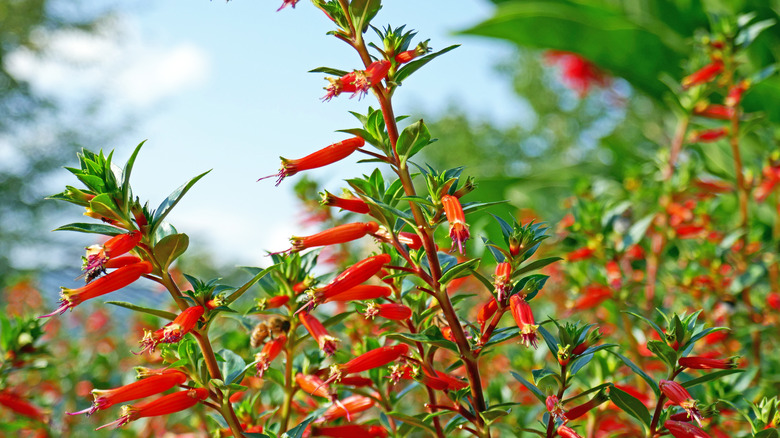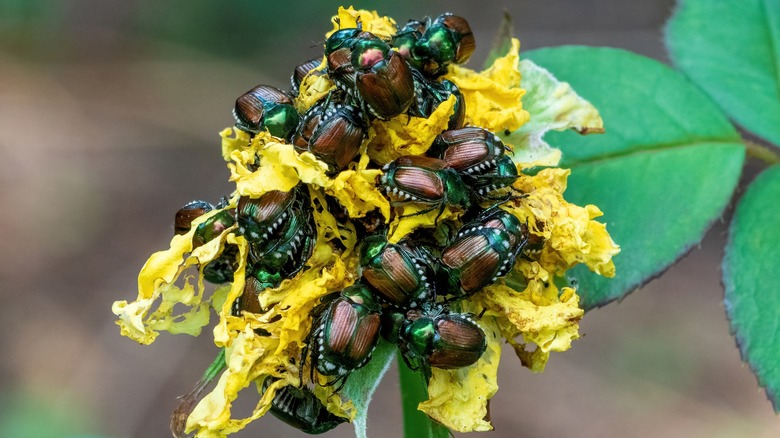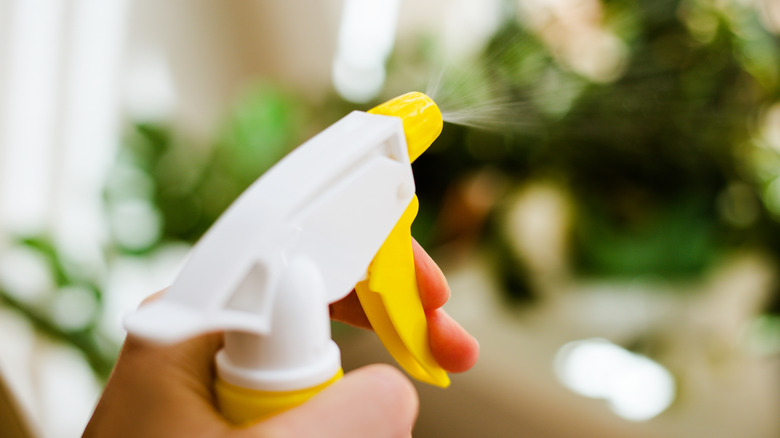Tips & Tricks To Prevent Pests From Destroying Your Cuphea Plant
We may receive a commission on purchases made from links.
Native to the Americas, Cuphea is a large genus with over 200 species of brightly colored flowering plants to choose from. Many gardeners turn to these vibrant beauties to transform their yard into a hummingbird haven and relish the appeal of their nectar-rich blooms to pollinators. However, they also soon realize that Cuphea plants don't just attract beneficial insects; they can also fall victim to common pests like Japanese beetles, aphids, thrips, and whiteflies. Not only do these pests cause damage to the plant's appearance, but without quick intervention, they can negatively affect its overall health. Monitoring your plants and regularly checking for signs can allow you to take action more quickly before an infestation occurs.
If you notice sticky residue, holes appearing in foliage, or foliage discoloration, it could be a sign that you have some unwelcome visitors in your garden. One eco-friendly method to manage pests is to use companion planting to benefit your garden. One species that grows well with Cuphea is common yarrow (Achillea millefolium), which attracts parasitic wasps to your garden. Although the name is a bit intimidating, these small creatures target several pests like caterpillars, whiteflies, aphids, mealybugs, and scales. While having natural pest control insects can be helpful, sometimes more direct action is required. Knowing which pesky intruder is harming your Cuphea can help you take the right action to eliminate them, so let's get into more of what to look out for.
Eliminate Japanese beetles with a common kitchen product
Japanese beetles are a common pest that can wreak havoc on Cuphea plants as they devour the leaves. Even worse, these invasive insects emit pheromones that attract more of them, like ringing a dinner bell, signaling to others that it's time to feast. If not taken care of quickly, this could lead to a large infestation. While healthy adult plants can withstand some damage, the beetles can destroy your Cuphea's delicate blossoms. Younger and less healthy plants may see a worse fate, including stunted growth and even death, if the beetles continue their feeding frenzy.
Although chemical pesticides are one way to eliminate them, it's best to opt for eco-friendly solutions that don't harm beneficial insects. Luckily, you likely have a chemical-free solution sitting by your kitchen sink: dish soap. Prepare the soapy water by mixing a tablespoon of dish soap per cup of water. Gently stir to combine and fill a container that's challenging for them to get out of, like a soda bottle or can. Head to your plants to hand-pick and drop any Japanese beetles you see into the mixture. The grease-fighting dish soap will dissolve their waxy coatings, drowning them. You'll need to repeat this process for a few days until you're confident you've gotten them all. Another option is to add the solution to a spray bottle, though you'll need to make sure you coat them entirely for it to be effective.
Combat soft-bodied pests with this natural pesticide
Aphids, thrips, and whiteflies are some of the worst garden pests you'll want to banish from your garden immediately. Unfortunately, these are also some common soft-bodied pests that target Cuphea plants. Each of these plant-damaging insects reveals their presence in different ways. When thrips eat the surface of flowers or leaves on your Cuphea, a telltale sign is silvery streaks on the foliage or blooms. Aphids and whiteflies are sap-sucking insects that leave behind a sticky residue, indicating their arrival. Some species of all these insects can spread disease when they feed, which can lead to the demise of your plants. So, it's crucial to take action if you notice any signs of these tiny invaders.
Neem oil is one of the best natural pesticides for eliminating soft-bodied pests on the spot. Extracted from the neem tree (Azadirachta indica), neem oil contains azadirachtin, which not only repels harmful insects but also smothers them on contact. Purchase neem oil, such as Bonide Captain Jack's Neem Oil, and follow the instructions carefully before applying it to any plants, as concentrated versions need to be diluted. To use, cover your plants entirely, making sure to get on top of and underneath all the leaves. Use neem oil in the morning to prevent sunburn and to cause as little disruption to beneficial insects as possible. Repeat this process weekly until there are no more signs of pests.


